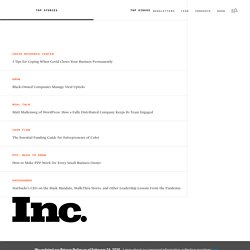

Harvard psychologist: The most emotionally intelligent people have these 12 traits. What makes someone great at their job?

Having knowledge, smarts and vision, to be sure. But what really distinguishes the world’s most successful leaders is emotional intelligence — or the ability to identify and monitor emotions (of their own and of others). Companies today are increasingly looking through the lens of emotional intelligence when hiring, promoting and developing their employees. Years of studies show that the more emotional intelligence someone has, the better their performance. What most people fail to realize, though, is that mastering emotional intelligence doesn’t come naturally.
And yet, he often wonders, I have all the qualities of emotional intelligence, so why do I still feel stuck in my career? This is a common trap: Tom is defining emotional intelligence too narrowly. After spending 25 years writing books and fostering research on this topic, I’ve found that emotional intelligence is comprised of four domains.
(Click here to enlarge chart) 1. 2. 13 Signs of High Emotional Intelligence. In 1995, psychologist and science journalist Daniel Goleman published a book introducing most of the world to the nascent concept of emotional intelligence.

The idea--that an ability to understand and manage emotions greatly increases our chances of success--quickly took off, and it went on to greatly influence the way people think about emotions and human behavior. But what does emotional intelligence look like, as manifested in everyday life? For the past two years, I've explored that question in researching my forthcoming book, EQ, Applied. In doing so, I've identified a number of actions that illustrate how emotional intelligence appears in the real world. 1.
Emotional intelligence begins with what is called self- and social awareness, the ability to recognize emotions (and their impact) in both yourself and others. That awareness begins with reflection. What are my emotional strengths? Pondering questions like these yield valuable insights that can be used to your advantage. 2. 3. Harvard Research Reveals How Mindful Leaders Develop Better Companies and Happier Employees. How to Control Your Emotions During a Difficult Conversation. Executive Summary It’s hard not to get worked up emotionally when you’re in a tense conversation. After all, a disagreement can feel like a threat. Your heart rate and breathing rate spike, your muscles tighten, the blood in your body moves away from your organs, and you’re likely to feel uncomfortable.
None of this puts you in the right frame of mind to resolve a conflict. Luckily, it’s possible to interrupt this physical response to clear the way for a productive discussion. It’s hard not to get worked up emotionally when you’re in a tense conversation. Episode 2: Emotional Intelligence. Emotional Intelligence Has 12 Elements. Which Do You Need to Work On? Although there are many models of emotional intelligence, they are often lumped together as “EQ” in the popular vernacular.

An alternative term is “EI,” which comprises four domains: self-awareness, self-management, social awareness, and... Esther is a well-liked manager of a small team. Kind and respectful, she is sensitive to the needs of others. She is a problem solver; she tends to see setbacks as opportunities. Emotional Intelligence Has 12 Elements. Which Do You Need to Work On? How Self-Awareness Pays Off.
The Beryl Institute - Improving the Patient Experience. As the newest member of The Beryl Institute Team, I want to begin by stating how honored I feel to be brought in as the Vice President of Experience Innovation.

I started my new role on October 1, 2017 and the timing could not have been better because my first day on the job meant a trip to Southlake, TX for a quarterly in-person staff meeting. Since I have been a long-time friend and board member of the Institute, it was not a shock to me when I learned that Jason Wolf, President, had assigned the team a book to read for our upcoming (my first) staff strategy meeting. I’ll call it “Jason’s Book Club.” The title of the book was Execution: The Art of Getting Things Done. I’ll be honest and say that the first few pages worried me because I immediately noticed this was primarily a book about business theory. Turns out, I was familiar with this “world” after all because I have experienced a lot of the dynamics the book explores while working in a hospital and working as a consultant.